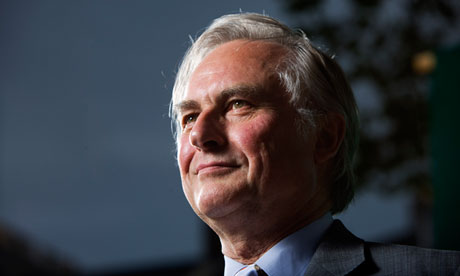Evolutionary biologist beats four Nobel prize winners for his global influence and significance on the year's biggest questions

A man of significance … Richard Dawkins headed a longlist of 65 names. Photograph: Murdo Macleod for the Guardian
When Prospect magazine listed Britain's leading public intellectuals in 2004 and invited readers' votes, it was Richard Dawkins who emerged as No 1. Nine years on, the biologist, author and campaigner has bettered that by topping its "world thinkers" rankings, beating four Nobel prize winners (and another contender regarded as certain to receive one soon) in a poll based on 65 names chosen by a largely US- and UK-based expert panel.
Joining him in the top 10 are the psychologists Steven Pinker (3) and Daniel Kahneman (10), the economists Paul Krugman (5) and Amartya Sen (7) and the philosopher Slavoj Žižek (6), who all, like him, figured in the magazine's first list of world-class thinkers in 2005.
A late run by the octogenarian British physicist Peter Higgs (8) secured him a place in an elite squad containing three other scientists, while the remaining slots are taken by academics turned politicians from the Middle East: Afghanistan's Ashraf Ghani (2), an economist who served as finance minister after the US-led invasion; Iraq's Ali Allawi (4), another ex-minister and author of The Occupation of Iraq and The Crisis of Islamic Civilization; and Egypt's Mohamed ElBaradei (9), prominent in the Arab Spring and now in opposition to Mohamed Morsi.
To qualify for this year's world thinkers rankings, it was not enough to have written a seminal book, inspired an intellectual movement or won a Nobel prize several years ago (hence the absence from the 65-strong long list of ageing titans such as Noam Chomsky or Edward O Wilson); the selectors' remit ruthlessly insisted on "influence over the past 12 months" and "significance to the year's biggest questions".
More
Joining him in the top 10 are the psychologists Steven Pinker (3) and Daniel Kahneman (10), the economists Paul Krugman (5) and Amartya Sen (7) and the philosopher Slavoj Žižek (6), who all, like him, figured in the magazine's first list of world-class thinkers in 2005.
A late run by the octogenarian British physicist Peter Higgs (8) secured him a place in an elite squad containing three other scientists, while the remaining slots are taken by academics turned politicians from the Middle East: Afghanistan's Ashraf Ghani (2), an economist who served as finance minister after the US-led invasion; Iraq's Ali Allawi (4), another ex-minister and author of The Occupation of Iraq and The Crisis of Islamic Civilization; and Egypt's Mohamed ElBaradei (9), prominent in the Arab Spring and now in opposition to Mohamed Morsi.
To qualify for this year's world thinkers rankings, it was not enough to have written a seminal book, inspired an intellectual movement or won a Nobel prize several years ago (hence the absence from the 65-strong long list of ageing titans such as Noam Chomsky or Edward O Wilson); the selectors' remit ruthlessly insisted on "influence over the past 12 months" and "significance to the year's biggest questions".
More
No comments:
Post a Comment